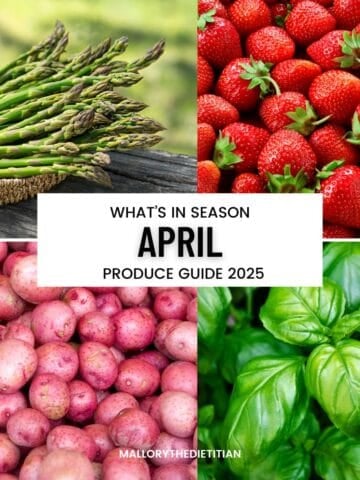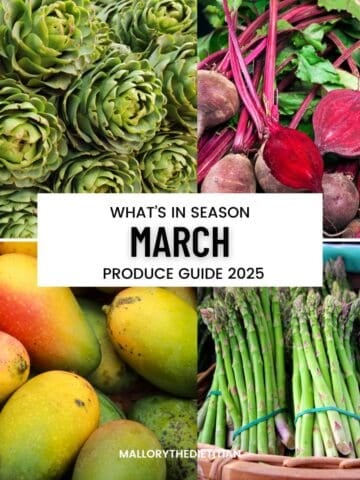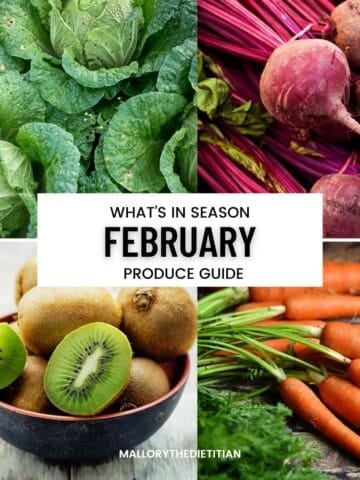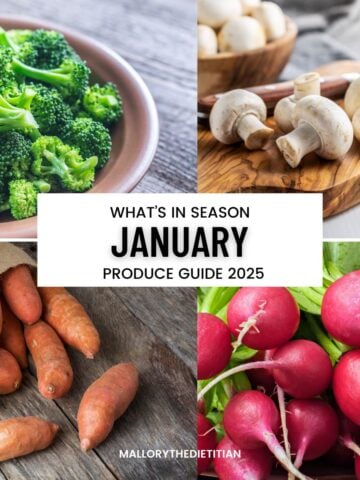As a Registered Dietitian, I have been asked a lot of questions about the 10 Principles of Intuitive Eating.
This post will help you understand the basics of intuitive eating and give you an overview of the 10 Intuitive Eating Principles. I hope by the end of reading this you will be empowered to decide whether intuitive eating is a good choice for you!

Jump to:
- What is Intuitive Eating?
- Intuitive Eating in Diet Culture
- What are the Benefits of Intuitive Eating?
- How to Start with Intuitive Eating
- Intuitive Eating vs. Mindful Eating
- Does Intuitive Eating Help with Weight Loss?
- The 10 Principles of Intuitive Eating
- Books about Intuitive Eating
- In Conclusion
- Looking for More Nutrition Education?
- Check Out These Nourishing Dietitian Recipes!
- 💬 Comments
What is Intuitive Eating?
Intuitive eating is a framework that focuses on honoring your body by listening to hunger and fullness cues, eating when you are hungry, and stopping when you are full.
It is meant to be a way of eating for the long term and is not a diet plan. Instead, an intuitive eating approach works to undo diet culture. At its center, it aims to help people find healing and peace and develop a better relationship with both food and body image.
The term Intuitive Eating was coined in 1995 by dietitians Evelyn Tribole and Elyse Resch, the authors of Intuitive Eating, a Revolutionary Program that Works. In their book, Tribole and Resch make the point that “you were born an intuitive eater, but this wisdom has probably been suppressed for most of your life by diet culture.”

Intuitive Eating in Diet Culture
Diet culture is everywhere - social media, magazines, conversations with friends and family members, and even pushed by some healthcare providers. A lot of people feel pressure to shrink their body even if that’s not how their body looks at its healthiest.
This has not only led to body image issues but also to setting food rules and labeling certain types of foods as "good foods" or "bad foods" and a tendency to get stuck in the cycle of following the latest new diet trend.
The global weight-loss and weight-management industry market size is projected to grow to $3.336 billion by 2027. And this growth is being driven by the increasing global obesity rate. With so much money being pumped into weight loss with less-than-ideal results, it may be worth it to ask ourselves if diet programs are really the right answer.

What are the Benefits of Intuitive Eating?
There are 3 main benefits of intuitive eating.
1. Intuitive Eating Teaches You to Listen to the Wisdom of Your Body.
- Your body's needs may be different than the next person's. Our individual nutrition needs are as different as our shoe size or height. Intuitive eating is an inside job that focuses on listening to your body and becoming aware of the signals it is sending you.
- Intuitive eaters are aware of and listen to physical hunger and fullness cues and base their eating habits on these cues.
- It’s learning to trust your body when it tells you it’s hungry and honor it when it tells you it’s satisfied.
- Listening to these cues can help you eat to satisfy your hunger without feeling guilty.
- It can also help prevent you from emotional hunger and overeating to the point of discomfort.
2. Helps You Heal Your Relationship with Food and Your Body Image.
- Intuitive eating is different than fad diets in that it is not a weight loss diet (although you may lose weight).
- There is an emphasis on learning to not only accept your body and get rid of negative emotions around weight, but to love and respect your body at its healthiest size.
- It is the idea of letting go of restrictions and diets that are centered on the desire to shrink your body or reach a certain body weight.
- It encourages you to eat foods for pleasure and enjoyment because you like the way food tastes in addition to eating for nourishment.
- As you develop a healthier relationship with food, you will learn to listen to what your body is craving and what it needs at any given meal.
3. Helps Undo the Effects of Diet Culture
- Since it is a holistic approach to eating, intuitive eating aims to undo “diet culture" and encourages eating the right amount of food instead of restricting calories or previously forbidden foods.
- It is a way to improve individual health and promote sustainable change as you shed the dieting mentality.
- Unlike diets, it’s a fluid way of eating that can be adjusted to your life on any given day.
- It helps you to remove the idea that you have to restrict foods or constantly be on a diet to be healthy.
Plus, a 2021 review of 125 Intuitive Eating studies showed that 97 of the studies included positive impacts of intuitive eating such as:
- Improved general well-being
- Positive body image
- Increased self-esteem
- Lowered disordered eating rates and diet rules

How to Start with Intuitive Eating
If you are interested in taking the first step on an intuitive eating journey, consider working with a Registered Dietitian who specializes in this non-diet approach. They can help guide you on the right path and work with you to personalize a plan for you with effective ways to work on improving your relationship with food and your body!
And I propose taking a mindset shift. Consider that the idea of failing a diet is not failing to lose weight, or losing weight and gaining it back. The failure of dieting is the lack of acceptance that people come in all shapes and sizes. Our worth is not defined by our thinness or a number on a scale.
When we learn this, it becomes more important to eat based on our current hunger level and stop eating based on the body’s satiety cues. It becomes more important to eat healthy foods because they make us feel great, give us energy, and support our body in the long run.
You can find freedom from deeply embedded negative thoughts about food and learn to love your body for all that it does for you.

Intuitive Eating vs. Mindful Eating
If you have heard of intuitive eating, you have likely also heard of mindful eating and wondered if there are any differences between the two. While they are very closely related, they are not the same thing.
Mindful eating focuses on being mindful or aware of your eating experience. This includes asking yourself questions like whether the food you are eating tastes good, how your body responds to the food you eat, and what the emotions are around the food you eat.
Intuitive eating, on the other hand, focuses on learning to listen to your body and ditch diet culture. Both intuitive eating and mindful eating can be practiced and learned simultaneously as a part of healing your relationship with food and your body.

Does Intuitive Eating Help with Weight Loss?
As with all things related to nutrition, the answer is not so simple. Whether intuitive eating helps with weight loss largely depends on the person. By definition, part of intuitive eating is learning to let go of weight stigma and diet culture. So while the concept of intuitive eating is not presented as one of the best ways to lose weight, it could be effective for weight management.
In a 2022 research study, intuitive eating practices were shown to reduce emotional eating in overweight or obese patients. Some people who break free of the yo-yo dieting hamster wheel and restrictive eating may notice that over time they lose a bit of weight as they stop the cycle of overeating or binge eating after a phase of restriction. Other people might gain weight when they stop restricting certain foods or entire food groups.

The 10 Principles of Intuitive Eating
1. Reject the Diet mentality
“Throw out the false hope to lose weight quickly, easily, and permanently.”
Tribole & Resch
The first principle of intuitive eating is around external factors that create pressure to be a certain size. Diet culture is everywhere, even in a time of body inclusivity.
Restrictions of specific foods or plans to shrink the body have ingrained fears in many people, particularly women, around eating and weight gain. Food-restrictive thoughts have been a part of many people's inner narrative for a long time and rejecting diet mentality can feel scary. But it is the first step to starting with intuitive eating.
2. Honor Your Hunger
“Once you reach the moment of excessive hunger, all intentions of moderate, conscious eating are fleeting and irrelevant.”
Tribole & Resch
Hunger is normal and healthy. It’s your body's way of telling you what it needs.
Calories from the foods we eat provide the energy to support our hearts to beat, lungs to breathe, and legs to walk. There’s a chemical neural feedback from our brain that tells us when the systems of our body need energy.
Many chronic dieters have silenced their hunger system by ignoring it altogether or drinking coffee, water, or chewing gum in place of food.
The second of the 10 principles of intuitive eating is around getting back in touch with your hunger cues and start to practice conscious eating. You can do this by asking yourself questions before you eat like:
- Am I feeling hungry right now?
- What am I hungry for?
- What’s my hunger level?
The consequences of ignoring hunger cues can range from personality changes to binge eating disorder.
A powerful example is a study looking at Nazi concentration camp survivors who lived through starvation. The study showed a disproportionate number had habits of binge eating disorder.

3. Make Peace with Food
“If you tell yourself that you can’t or shouldn’t have a particular food, it can lead to intense feelings of deprivation that build into uncontrollable cravings and often, bingeing.”
Tribole & Resch
We are wired to want the things we are told we can’t have.
When we forbid or restrict certain foods and see them as “bad,” we turn on the natural reaction to crave those very things and feed an intense desire to overeat. And worse, to associate certain foods with feelings of guilt or failure.
Restriction causes people to closely calculate their calorie or macro intake through apps on their phones instead of listening to their body cues.
The third principle of intuitive eating encourages you to make peace with food. Give yourself unconditional permission to eat while still listening to your body’s hunger and fullness cues. This doesn’t mean eating past the point of satisfaction. That doesn’t feel great and often leads to physical discomfort. It means eating when you are hungry and stopping when you are full.
*A caveat to this is avoid foods if you have an intolerance or allergy or have a medical condition related to nutrition such as diabetes or high blood pressure.
4. Challenge the Food Police
“These thoughts come from sneaky diet culture books and programs masquerading as a “lifestyle,” “detox,” “cleanse” or wellness diet.”
Tribole & Resch
The Food Police includes the messages society gives us and the voice that comes from our inner thoughts around food. That voice that tells you that you “shouldn’t” or “can’t” eat something. The food police put rules and laws around eating. We feel guilty if we break them, even if we don’t get “caught”.
When we’re toddlers, we know what we want and when we are hungry and full. Unfortunately, if you grew up in a family that was weight-focused, the food police started showing up early. If not, it probably didn’t take long before you started absorbing messages about food and weight.
The fourth of the 10 principles of intuitive eating teaches that to change the narrative, you have to identify the food police and discard what it’s saying.
Replace hurtful messages with helpful messages.
- Don’t praise yourself for eating a salad because it fits your “rules.” Praise yourself because it’s what you felt like eating, gave your body nourishment and left you feeling satisfied.
- Instead of guilting yourself for eating cookies, thinking about where you’ll “make up for it” tomorrow, think of how much you enjoy the taste. And how nice it is to be able to have just one and feel content knowing that the others are there if you really want another.

5. Discover the Satisfaction Factor
“Americans have gotten so focused on the alchemy of foods… that we have neglected a very important role that eating plays in our lives- provision of pleasure.”
Tribole & Resch
The fifth of the 10 principles of intuitive eating encourages finding pleasure in food. Listening to what you’re craving helps you to feel satisfied after a meal and more in control of your eating.
Remember Maslow’s hierarchy of needs? At the bottom are our basic physiological needs which include food. By restricting a certain type of food, a person may stop themselves from moving up the pyramid to the next levels: love, belonging, self-esteem, and self-actualization.
Finding satisfaction in foods means asking yourself questions like:
- What do I feel like eating right now?
- Will this food satisfy me and give me enjoyment?
Learning to appreciate your food, slow down and eat when you’re moderately hungry rather than ravenous, and savor your food can help you avoid uncontrollable cravings for things like a piece of chocolate cake.
6. Feel your Fullness
“Listen for the body signals that tell you that you are no longer hungry and observe the signs that show you’re comfortably full.”
Tribole & Resch
You were taught to clean your plate, but you don’t have to eat everything in front of you just because it’s there. Feeling your fullness also means you don’t have to stop yourself from getting seconds if you’re still hungry.
Diets with small portion sizes or meal replacement shakes can lead to overeating and food cravings when you’re “given permission” to eat real food. Intermittent fasting can increase overeating in the hours eating is “allowed”.
Respecting your body’s signals of fullness requires being mindful and conscious of your eating experience. If you are practicing intuitive eating, pause in the middle of a meal to check in with rational thought and decide if you are satisfied or not.

7. Cope with Your Emotions with Kindness
“Anxiety, loneliness, boredom, and anger are emotions we all experience throughout life….Food won’t solve the problem. You ultimately have to deal with the source of the emotion.”
Tribole & Resch
Emotional eating. We've all been there. Eating when you’re emotionally hungry but not biologically hungry is universal. It starts somewhere between being offered a lollipop at the doctor’s office and diving into a carton of ice cream after your first breakup.
One way to approach the seventh of the 10 principles of intuitive eating is to ask yourself questions like:
- Am I hungry?
- If not, what do I need?
- What might help me cope with this feeling other than eating?
Some non-food ways to cope with your emotions are:
- Rest! Take a nap.
- Meditate. Journal.
- Reach out to a loved one.
- Go on a walk outside.
- Turn on your favorite playlist.
Learning to cope with emotions in different ways is challenging if you are used to turning to certain foods. Be patient with yourself and have grace. It takes time to undo years of habits that were ingrained during the highest and lowest periods of your life.
8. Respect your Body
“It’s hard to reject the diet mentality if you are unrealistic and critical of your body size or shape. All bodies deserve dignity….the problem isn’t your body, it our fatphobic culture”
Tribole & Resch
The eighth principle of intuitive eating is about shifting your focus to loving and respecting the body that you have.
Loving your body:
- Make peace with your genetics and your body at its healthiest weight when you aren’t restricting or overeating.
- Think of all your body does for you. It lets you play with your kids or walk your dog.
- Focus on the parts of yourself you do like.
- Pamper your body through things like a bubble bath or a trip to the sauna.
Respecting your body:
- Take care of your physical and mental health.
- Meet your body’s basic needs.
- Eat when you are hungry. Stop when you are full.
The popular Health at Every Size (HAES) movement is centered around the principles of weight inclusivity, health enhancement, eating for well-being, respectful care, and life-enhancing physical movement.
Think about the things people have said to you that impact how you think about your body. Be intentional about having more positive thoughts when you look in the mirror.

9. Movement- Feel the Difference
“Shift your focus to how it feels to move your body, rather than the calorie-burning effect of exercise.”
Tribole & Resch
Rather than focusing on burning calories, exercise for the joy and health benefits that come with moving your body. Many chronic dieters have also experienced negative feelings around exercise. Working out while in a calorie deficit feels more like a chore and less like fun. Especially if you limit carbs, the preferred fuel for exercise.
If you are eating enough to support your body, exercise has tons of health benefits including:
- Increased metabolism
- Decreased blood pressure and improved cardiovascular health
- Decreased risk of chronic illnesses
- Improved sleep
If you are someone who has over-exercised or focused on exercise only as a way to lose weight or burn calories, you might consider taking a break. Bring in exercise when you can focus on the health benefits and joy of moving your body rather than using it as a tool to look a certain way.
This is what the ninth of the 10 principles of intuitive eating is about. Get aware of how moving your body in different ways makes you feel. Try all kinds of exercise to find what you love!
10. Honor your Health- Gentle Nutrition
“Make food choices that honor your health and taste buds while making you feel good.”
Tribole & Resch
We have come to the last of the principles of intuitive eating, principle 10. This idea of honoring your health through gentle nutrition melds together how you feel about what you eat with the science that shows what is most nourishing for your body.
When you learn to listen to your body, you open the door to more food variety. This can lead to improved nutrition. Some people might find it helpful to first work on principles 1-9 and come back to principle 10 later.
The goal is that healthy eating becomes enjoyable. Learn to prepare healthy foods in a way that tastes great to you. And most importantly, be aware of how you feel when you are eating more healthful, nutrient-dense foods. You probably have more energy and less bloating and discomfort. You may even notice a positive difference in your skin, which is a bonus!

Books about Intuitive Eating
Below are some great books if you are interested in learning more about Intuitive Eating!
Intuitive Eating, A Revolutionary Anti-Diet Approach by Evelyn Tribole and Elyse Resch

In Conclusion
Intuitive eating focuses on healing your relationship with food and your body by learning to listen to your hunger and fullness cues. Intuitive eating is not a diet. The 10 Principles of Intuitive Eating focus on learning to shed diet culture and love and respect your body at whatever size it is.
I hope you enjoyed this article and learned something new! I would love to hear from you if so. Please leave me a comment below or find me on Instagram....I love knowing there’s people out there reading my articles. 🙂 IG: @mallorythedietitian
References: Intuitive Eating, 4th Edition, A Revolutionary Anti-Diet Approach by Evelyn Tribole and Elyse Resch, intuitiveeating.org, Cleveland Clinic, Psychological Medicine, Association for Size Diversity and Health, International Journal of Eating Disorders, Wikipedia, Genius.com
Looking for More Nutrition Education?
Here are some posts you may enjoy:

























Comments
No Comments